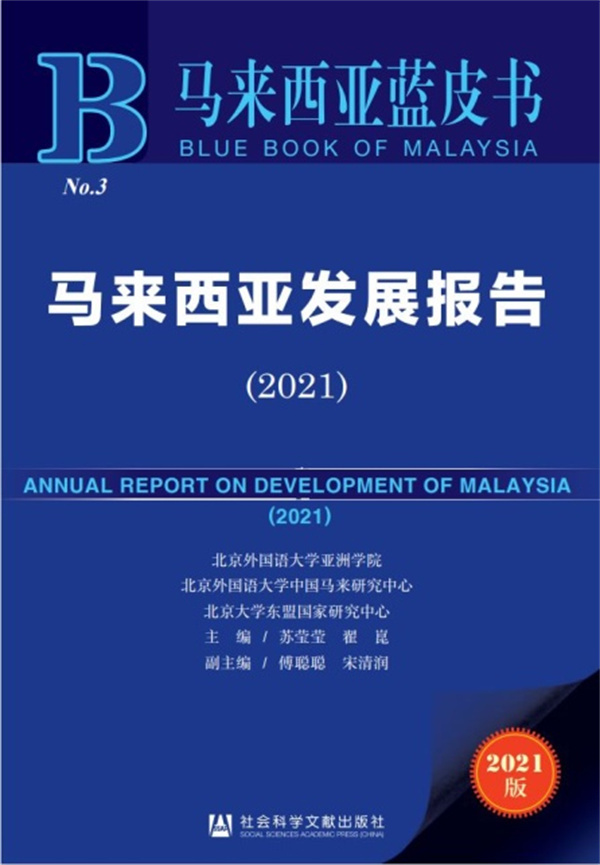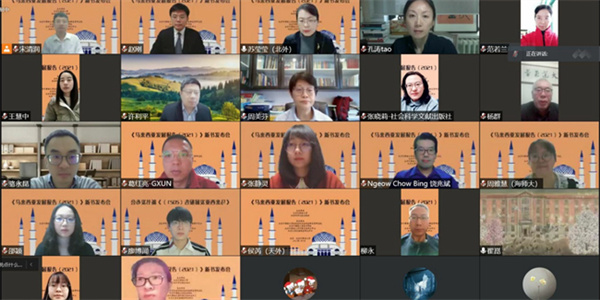- Research
- Research Centers
- Journals
- Admission
- Introduction
- Programs
- Application
- Alumni & Giving
- Alumni Club
- Giving
A launch ceremony for the Annual Report on Development of Malaysia (2021) was held online on Jan 9.
The event was hosted by the Academy of Regional and Global Governance, the School of Asian Studies and the Centre for China-Malay Studies at Beijing Foreign Studies University (BFSU), the Research Center for ASEAN Countries at Peking University (PKU) and the Social Sciences Academic Press (SSAP).
Attendees included scholars from prestigious universities and research institutions, including BFSU, PKU, Tsinghua University, Sun Yat-sen University, the University of Malaya, the National University of Singapore, the Chinese Academy of Social Sciences and the China Institutes of Contemporary International Relations (CICIR) and representatives from the SSAP and media outlets in China.

Annual Report on Development of Malaysia (2021) is released on Jan 9. [Photo provided to bfsu.edu.cn]
Zhao Gang, a member of the standing committee of the CPC BFSU committee and vice-president of the university, said the book is a signature project for BFSU to build a world-class university with first-class disciplines. As an inseparable part of the blue book series in international and regional studies and the significant research output of the School of Asian Studies, the report has high academic value and prospects for extensive application.
The report pools the wisdom of experts and scholars in Malaysian studies from home and abroad and strengthens academic exchanges between the two countries. It also provides references for the general public to understand Malaysia, as well as bilateral relations, development strategies and people-to-people exchanges between China and Malaysia, he added.
Yang Qun, editor-in-chief of the SSAP, noted that the Annual Report on Development of Malaysia (2021) presents the political, economic and diplomatic situation in Malaysia in 2020 and early 2021, as well as the latest developing trends of China-Malaysia relations under the impact of the COVID-19 pandemic. The book marks an important step forward in building think tanks and will help to deepen the public's understanding of Malaysia.
Yang said the SSAP will continue to promote the high-quality development of the book.
Su Yingying, dean of the School of Asian Studies at BFSU, thanked people from all walks of life for recognizing the book, and showed her gratitude to professionals involved in the writing from China and Malaysia.

Scholars from prestigious universities and research institutions from China and abroad exchange views on Malaysia’s politics, economy and diplomacy on Jan 9. [Photo provided to bfsu.edu.cn]
Following the speeches, more than 10 scholars in Malaysian studies exchanged views on changes in the country's politics, economy and diplomatic strategies, as well as its digital economy and automobile industry under the impact of the COVID-19 pandemic and China-Malaysia relations.
Zhai Kun, vice-dean of the Institute of Area Studies at PKU, delivered a concluding remark in which he said the Annual Report on Development of Malaysia (2021) covers three major dilemmas of pandemic control, national development and foreign relations faced by many countries, including Malaysia, and explains its development in the previous two years. Zhai called on scholars to pay attention to Malaysia’s role in regional studies.
Organized by the School of Asian Studies and the Centre for China-Malay Studies at BFSU and the Research Center for ASEAN Countries at PKU, and edited by experts from BFSU, PKU and the CICIR, the Annual Report on Development of Malaysia (2021) focuses on Malaysia’s national conditions and international status and elaborates on the political issues, economic environment, diplomatic relations and national security of the country.
By giving full play to strong academic cooperation between both sides, the book provides references for the docking of China's Belt and Road Initiative and Malaysia’s domestic development plans, and also helps more Chinese enterprises to go global.